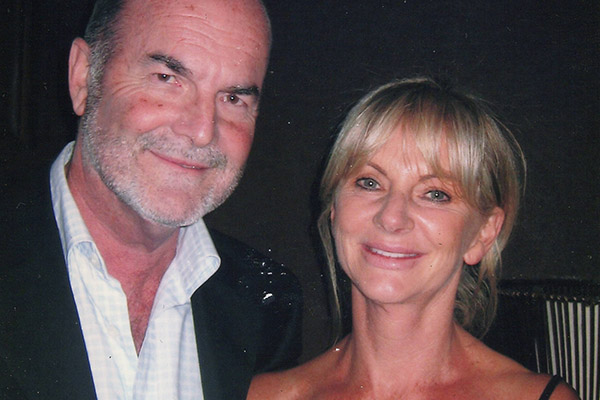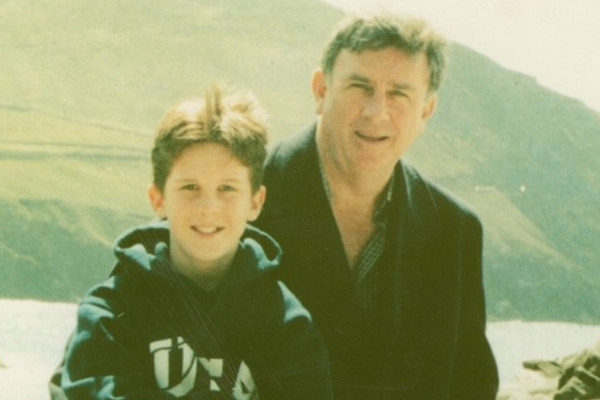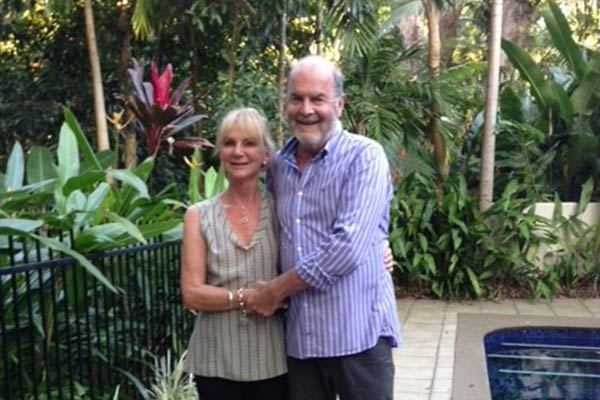
Gay with her second husband, Robert
Being a cancer carer is never easy, but for Gay it came with an extra burden: her own cancer diagnosis.
Not long before Christmas in 1999, Gay, then 44 and working as a flight attendant, went to hospital for breast enhancement surgery. Instead, she came out with a breast cancer diagnosis.
The doctor told her that it was invasive – a mastectomy had to be done immediately.
She quickly had surgery and got started on chemotherapy. But just as Gay’s journey as a cancer patient was beginning, so did another as a cancer carer, when her husband, Kerry, suddenly had a seizure.
“We were Christmas shopping, and he collapsed in the shopping centre,” Gay said.
An ambulance took him to the hospital, where he was diagnosed with a brain tumour. The prognosis wasn’t good; the doctors said Kerry’s tumour was a high grade and inoperable. He had three months to live.
“Because this was just three weeks after my diagnosis, everything came as quite a shock. I thought to myself at the time, ‘Well, this was going to be about me – now it’s about us.’”
Gay’s prognosis was worrying, but she says that for Kerry, a real estate agent and business owner, “it was a matter of: How long can we keep him going for?”
“So it was fun and games for a while,” Gay said. They did their best to keep things normal, particularly for their 12-year-old son, for whom Gay arranged counselling through his school, which she says is one of the best things she has done.

Kerry with their son, who was just 12 when Kerry and Gay were diagnosed with cancer.
Gay balanced her own treatment with caring for Kerry. Despite the incredible difficulty of doing both, she didn’t begrudge her responsibility as a carer. Once, when her husband refused her help, she said: “Darling, I’m your wife. I love you, and if I was in your position, you would do it for me.”
After eight difficult months, Kerry passed away.
“I always thought after that: Why us?” Gay said. “We were a wonderful, happy family, life was really good. I asked myself that for years.”
Slowly, Gay’s life began to resume. After surgery and further treatment, she was declared to be in remission in 2002.
But that wasn’t the end of her experience with cancer. In the following years Gay saw her sister and sister-in-law be diagnosed with breast cancer; her mother-in-law die of the same brain tumour as Kerry; two cousins die of pancreatic and brain cancer respectively; her best friend pass away from pancreatic cancer; and her grand-niece be diagnosed with a brain tumour at just 18 months old.
“I seem to have been surrounded by the feeling that you don’t know when or where something is going to change your life forever,” Gay said.
Yet her life changed for the better when she married Robert, an academic and business owner who had worked at the CSIRO and Deakin University, seven years after Kerry passed away.

They lived around the Glen Iris and Camberwell areas of Melbourne, where Gay had been for several decades. She had moved from her job with Qantas to working as a personal trainer.
“We were very happy together,” Gay said.
But one day, Robert told her he was having trouble going to the bathroom. They rushed to hospital emergency, where a CT scan showed six tumours in his bowel.
“Because of my experience with cancer, I knew exactly what lay ahead,” Gay said. “So I cared for him – I was prepared.”
Through his delirium, 3a.m. palliative care visits, regular pharmacy runs to fill Robert’s morphine script and learning to change an ileoscopy bag, Gay again did all she could to care for her husband.
“Again, Robert survived for only eight months before passing away,” Gay said. “Ironically, when the palliative care was eventually called in, it was the same care team I’d had for my first husband, Kerry – as they walked in, they said ‘Gay, I’m so sorry! Well, we don’t need to teach you anything, do we?’”
Gay again wondered why cancer had affected her life this way. It wasn’t until after Robert died that she began to find an answer, and this was helped by her volunteering for Cancer Council’s Cancer Connect services.
“I just knew this was what I was meant to do,” Gay said. “When I saw the ad for the volunteer role, I felt all at once that everything I had been through was now going to help others.
“I’ve walked the same path, so I can really understand what this journey is – it’s the fight of your life.”
While Gay has endless practical advice to offer, she likes to remind the people she speaks to that being a carer is just about doing the best you can for the person you love.
“Being a carer is not just one job, it’s a combination of many,” she said. “Everyone worries if they are doing the right thing. But if you do the best you can, how can that not be right?"
And Gay has now resolved her question of ‘Why?’
“There really is no answer to that,” she said. “Cancer can affect anyone at any time in their life.
“It is unfortunate that I have all this experience with cancer, but I’m grateful it has enabled me to help others. I feel like something good has come out of something tragic.”
